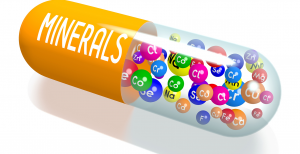02 Aug What are the necessary minerals the body needs?

The body needs daily some types of minerals in order to operate efficiently with the goal of affording us our health. They are boron, calcium, chlorine, chromium, copper, fluorine, iodine, iron, magnesium, manganese, molybdenum, nickel, phosphorus, potassium, selenium, sodium, vanadium, and zinc. Choosing foods each day that could provide us with vitamins and minerals are crucial for our overall health. According to the US Department of Agriculture (USDA), adult Americans practically do not get enough of these minerals: calcium, potassium, fiber, and magnesium.
Calcium: Our body needs calcium to build strong bones and teeth in our childhood and adolescent years. As an adult, we need calcium to maintain bone mass. We should get a little bit over 1000 milligrams of calcium daily. The following foods are good sources of calcium: Fish and sea food, pink salmon and ocean perch, beans, spinach, almonds, oatmeal and Bok Choy.
Potassium: Helps the body maintain a healthy balanced blood pressure. It plays a huge role in keeping our blood pressure normal. It is recommended to consume a little bit over 4000 milligrams each day. The following foods are a good source for potassium: potatoes, beans, bananas, peaches, cantaloupe, honeydew melon, fish, halibut, yellow fish tuna, rockfish, cod and tomato based products, including Bok Choy.
Magnesium: This is one of the most essential mineral that helps the body produce energy. It also helps our muscles, arteries, and heart work properly. It would be helpful to have a little bit over 350 milligrams daily. These foods can provide you with some magnesium: Pumpkin, spinach, artichokes, beans, tofu, brown rice, Bok Choy. In the nut family, we have the Brazil nuts, almonds, cashews, beetroot and peanuts. Ginger is also a good source of magnesium. IRON: Iron’s job is to carry oxygen throughout your body. Iron is also indispensable for the body to create and grow Red blood cells. Iron deficiency causes anemia, dizziness, constant fatigue, shortness of breath and tiredness. You can increase your iron intake daily by the consumption of these foods and legumes: Shellfish is abundant with iron and clams; oysters, including mussels, are expressly great sources to get a good dose of it and some protein. Spinach, rich in vitamin C, possesses also iron. In the legume family, we have beans, lentils, chickpeas, peas and soybeans. Broccoli, kale, Swiss, chard, collard, including beet greens, cabbage, brussels sprouts; pumpkin seed, red meat, eggs, turkey, tofu and quinoa are good sources of iron. Peanuts, pecans, walnuts, pistachios, almond, cashew, sunflower seeds, raisin, peaches and prunes also have iron that we need. Pure raw honey with no additives or antibiotics, sesame, hemp and flaxseed too. We also have potatoes (mostly the skin), tomato, mushrooms, olives, mulberries, whole grains, Amaranth, spelt, oats.
The job that the iron gets done for the health of our body is really important that a daily consumption is a must and express as truly our body cannot produce iron by itself. So strap yourself with iron to boost your oxygen flow and increase the ability for your body to produce more red blood cells at a continuous basis. Especially during menstruation, it becomes a great deal to consume iron-rich foods to compensate any deficiency as it is highly probable you will be losing blood as a result. Please note that the lentils, seeds and nuts rich in iron are also rich in fiber, minerals and vitamins.




No Comments